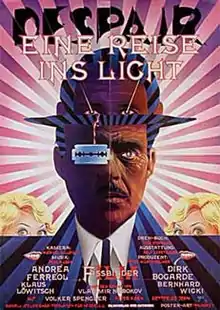| Despair | |
|---|---|
 Theatrical release poster | |
| Directed by | Rainer Werner Fassbinder |
| Written by | Tom Stoppard (screenplay) Vladimir Nabokov (novel) |
| Starring | Dirk Bogarde Andréa Ferréol Klaus Löwitsch Volker Spengler |
| Cinematography | Michael Ballhaus |
| Edited by | Reginald Beck[1][2] Juliane Lorenz Franz Walsch |
| Music by | Peer Raben |
| Distributed by | Filmverlag der Autoren (West Germany) New Line Cinema (USA) |
Release dates | 1978 (West Germany) 1979 (USA) |
Running time | 120 |
| Country | West Germany |
| Language | English |
| Budget | 6 million DM ($2.6 million[3]) |
Despair is a 1978 film directed by Rainer Werner Fassbinder and starring Dirk Bogarde, based on the 1934 novel of the same name by Vladimir Nabokov. It was Fassbinder's first English-language film and was entered into the 1978 Cannes Film Festival.[4]
Similarly to the novel, the tone of the film is ironic. The plot is mostly similar to the novel, although one of the key characters is significantly altered in the adaptation.
Plot
Hermann Hermann lives in Berlin during the Weimar Republic. A refugee from Soviet Russia, with a Baltic German father and a wealthy Jewish mother, he has inherited a business making chocolates. His Jewish wife Lydia, voluptuous but not intelligent, has an over-close relationship with her bachelor cousin, a painter called Ardalion. As the Great Depression bites and Nazi thugs start targeting Jewish businesses, with his firm becoming less profitable and Germany less hospitable, Hermann starts dreaming of escape. He already has moments of leaving his body, for example to watch himself making love to his wife, and consults a man he believes to be a Viennese psychiatrist. In fact it is a life insurance salesman, who sells Hermann a policy.
After watching a film which features a doppelgänger, he sees an unemployed drifter called Felix, who he decides is his double. Felix, bemused as there is no resemblance between them, goes along with the idea when Hermann promises him a job. The work, it emerges, is to act as Hermann's double for a substantial lump sum.
Hermann is now able to finalize his plan, which is to erase all traces of his unwelcome existence. After getting Ardalion to write a letter that demands money to leave Lydia and go painting in Switzerland, he shows the letter to the insurance salesman as evidence that he is being blackmailed. Then he tells Lydia that he has a troubled twin brother who is contemplating suicide. He will change clothes with his brother, so that the corpse is taken as his, and lie low in Switzerland. When Lydia has been paid the insurance money, she is to join him there.
Having lured Felix to a secluded place in the woods, Hermann dresses Felix up in his own clothes, shaves his facial hair, adjusts his hairstyle and files his nails. Hermann then shoots him dead. Dressed as Felix and with Felix's passport, he goes to a Swiss hotel, where he learns from newspapers that Berlin police are seeking the murderer and suspect it is him. Moving in increasing desperation from village to village, in the end he is spotted by Ardalion and armed police close in. He explains that he is an actor making a film and they must stand aside to let him go on.[5]
Cast
- Dirk Bogarde – Hermann Hermann
- Andréa Ferréol – Lydia Hermann
- Klaus Löwitsch – Felix Weber
- Volker Spengler – Ardalion
- Peter Kern – Müller
- Alexander Allerson – Mayer
- Gottfried John – Perebrodov
- Hark Bohm – Doctor
- Bernhard Wicki – Orlovius
- Adrian Hoven – Inspector Schelling
- Roger Fritz – Inspector Braun
- Y Sa Lo – Elsie
- Armin Meier – 1st Twin/2nd Twin/Foreman
- Ingrid Caven – Hotel receptionist
- Voli Geiler – Madam
Production
The film was Fassbinder's first English language film and his most expensive to date, with a cost of $2.6 million, compared to his earlier films which had budgets below $300,000.[3]
Home media
Despair was released to region 1 DVD and Blu-Ray in 2011.[6][7]
References
- ↑ Some sources do not credit Beck's editing, but the listing submitted to the Academy of Motion Picture Arts & Sciences for Academy Award consideration does include him as an editor. The listing does not include Franz Walsch, a pseudonym for Fassbinder, who is often credited as an editor, but it does include Fassbinder. See "Index to Motion Picture Credits: Despair". Academy of Motion Picture Arts & Sciences. Archived from the original on 2015-10-01. Retrieved 2015-09-30.
- ↑ Le Cain, Maximilian (December 2003). "Dreams of Fassbinder: An Interview with Juliane Lorenz". Senses of Cinema (29).
But I learned editing that night… We really created the film anew in one night because Rainer had an English editor, Reginald Beck, who started the editing but they didn't get along. I took it over and we created a new story.
- 1 2 "Pressman, Now In California, Sets Six Features For Release". Variety. May 31, 1978. p. 38.
- ↑ "Festival de Cannes: Despair". festival-cannes.com. Retrieved 2009-05-12.
- ↑ "Emigrating to Madness: Despair (Eine Reise ins Licht) – Senses of Cinema".
- ↑ Despair (DVD (region 1)). Olive Films. 2011. OCLC 722924420. Restoration by Bavaria Media in co-operation with Cinepostproduction.
- ↑ Despair (Blu-Ray (region 1)). Olive Films. 2011. OCLC 800429901. Restoration by Bavaria Media in co-operation with Cinepostproduction.
Further reading
- Lopate, Phillip. "A Date with Fassbinder & Despair". lingo 6. A personal essay related to the author's first viewing of Despair in 1979.
- Tibbetts, John C., and James M. Welsh, eds. The Encyclopedia of Novels into Film (2nd ed. 2005) pp 95–96.